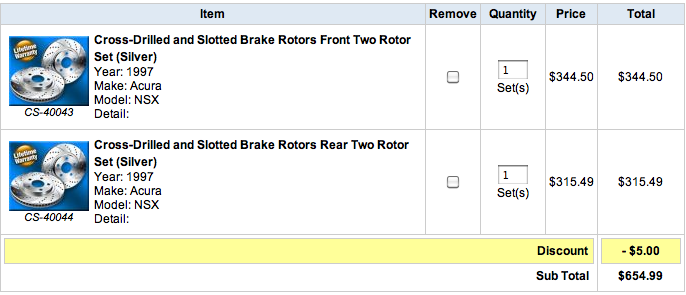I would like to thank everyone for their help on my post "what tires are you using". Now that is over I would like to start one about breaks..
I guess I am working on my car from the ground up. Wheels and tires are great now, but the brakes really need attention. Chris at SOS told me that the nasty high pitch squeak I am hearing is most likely from part 25 & 20 from this diagram:
http://www.acuraoemparts.com/delray...T&catcgry5=FRONT+BRAKE&ListAll=All&vinsrch=no
I had my rotors looked at and they are near their end of life, so I got some cheap pads to tide me over until I get new rotors because I was always under the assumption that you shouldn't continue to use your old pads on new rotors or vice versa. (is this correct?)
I was thinking about getting a BBK kit, but that costs 6K for a full set.. which would solve both my problems but thats a lot of money! I may track the car some day, but not right away. They look really nice, but its a waste of money if you don't need them, right? Maybe just new rotors and pads and fix the squeak with those parts and paint the calipers to dress it up a bit?
So here are my questions:
1. What drilled & slotted rotors are people buying these days?
2. What pads?
3. Feedback on the SOS caliper painting kits?
4. When are BBK's needed?
I did a search for past threads on rotors and pads and many of the mentioned items are discontinued and links broken. I thought this would be a good time to make a new thread to update the info out there.
For instance, I came across this: http://brakeperformance.com/brake-rotors/Premium-Dimpled-and-Slotted-Brake-Rotors.php
Does it really matter these are no-name rotors? What do you look for in a rotor? Are there certain pads not to use with certain rotors?
Jason
I guess I am working on my car from the ground up. Wheels and tires are great now, but the brakes really need attention. Chris at SOS told me that the nasty high pitch squeak I am hearing is most likely from part 25 & 20 from this diagram:
http://www.acuraoemparts.com/delray...T&catcgry5=FRONT+BRAKE&ListAll=All&vinsrch=no
I had my rotors looked at and they are near their end of life, so I got some cheap pads to tide me over until I get new rotors because I was always under the assumption that you shouldn't continue to use your old pads on new rotors or vice versa. (is this correct?)
I was thinking about getting a BBK kit, but that costs 6K for a full set.. which would solve both my problems but thats a lot of money! I may track the car some day, but not right away. They look really nice, but its a waste of money if you don't need them, right? Maybe just new rotors and pads and fix the squeak with those parts and paint the calipers to dress it up a bit?
So here are my questions:
1. What drilled & slotted rotors are people buying these days?
2. What pads?
3. Feedback on the SOS caliper painting kits?
4. When are BBK's needed?
I did a search for past threads on rotors and pads and many of the mentioned items are discontinued and links broken. I thought this would be a good time to make a new thread to update the info out there.
For instance, I came across this: http://brakeperformance.com/brake-rotors/Premium-Dimpled-and-Slotted-Brake-Rotors.php
Does it really matter these are no-name rotors? What do you look for in a rotor? Are there certain pads not to use with certain rotors?
Jason








